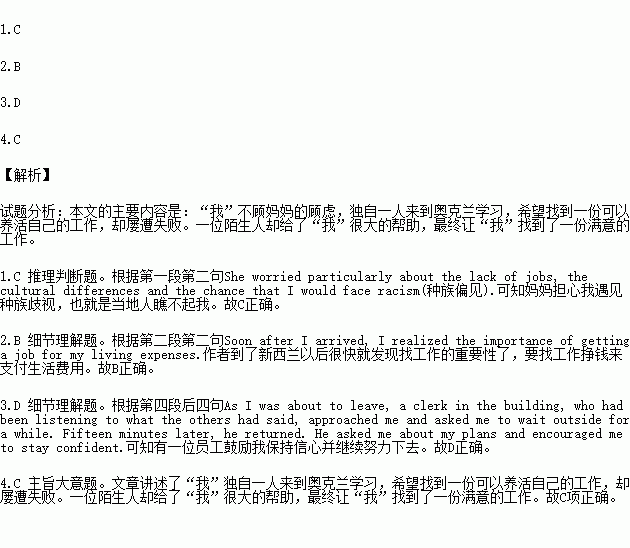题目内容
When I began planning to move to Auckland to study, my mother was a little worried about the uncertainty of living in a place that was so different from India, where we lived. She worried particularly about the lack of jobs, the cultural differences and the chance that I would face racism(种族偏见).
Despite these worries, I came to New Zealand in July 2009. I have found the place and people very nice and supportive. Soon after I arrived, I realized the importance of getting a job for my living expenses.
Determined to do this on my own, I spent a whole day going door to door asking for a job. However, I received little response. This became my routine every day after college for a few weeks.
One afternoon, I walked into a building to ask whether there were any job opportunities. People there were very surprised, and advised me not to continue my job search in that manner. As I was about to leave, a clerk in the building, who had been listening to what the others had said, approached me and asked me to wait outside for a while. Fifteen minutes later, he returned. He asked me about my plans and encouraged me to stay confident. Then he offered to take me to Royal Oak to search for a job.
I was a little surprised but had a good feeling about him. He gave me some suggestions on dressing and speaking. I handed out my resumes and went home feeling very satisfied. The following day, I received a call from a store in Royal Oak offering me a job.
It seems that the world always gives back to you when you need it .And this time,it was a complete stranger who turned out to be a real blessing.
1.What wasn’t the author’s mother worried about?
A. The author couldn’t speak the local language.
B. The author wasn’t familiar with local customs.
C. People might look down on the author.
D. It might be difficult for the author to find a job.
2.After staying in New Zealand for a short time, the author ______.
A. decided to go back to his own country
B. had to find a job to cover his living expenses
C. felt the local people were not very friendly
D. wanted to get a job that needed practical skills
3. When the author went into a building to look for a job, ______.
A. a clerk recommended him to the company he worked for
B. he was confident that he would find a good one
C. he found many college students like him already there
D. a clerk gave him encouragement and advice
4.What is the story mainly about?
A. How a stranger offered the author a job.
B. How a stranger turned out to be a real blessing.
C. How the author was helped to get a job by a stranger.
D. How the author adapted himself to a new situation.

